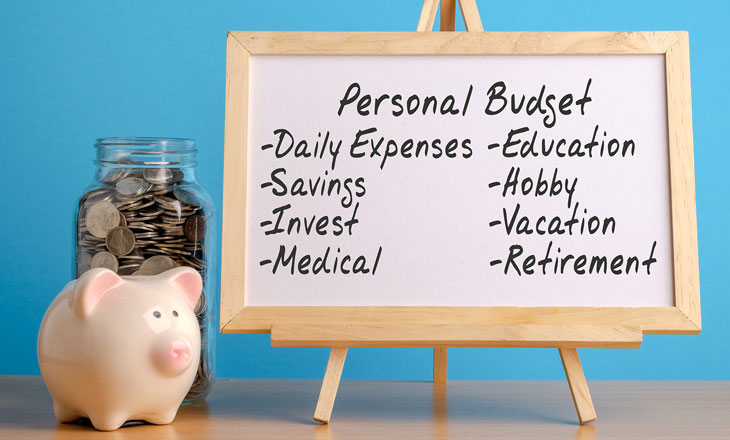Upcoming Seminars/Webinars
Check out these upcoming events at iTHINK Financial.
Budget Bootcamp Pt. 1: How to Evaluate Your Personal Finances
By: iTHINK Financial | Feb 26, 2018

The First Step to Financial Health and Independence
Whether you’re just starting your personal finance journey, or you just need a little help getting back on track towards a healthy financial future, we’re kicking off a new series just for you. From conducting a personal finance assessment,
to developing a plan and budget to meet your goals and putting that strategy into action, our Budget Bootcamp will cover it all step by step.
Today, we’re talking about the most important step of all—getting started.
When it comes to managing your finances, you need to know where you stand before mapping out where you’d like to go. Honestly assessing your personal finances can be stressful, demanding and downright scary, but a thorough evaluation is the
first move towards financial health and independence.
If you’re unsure how or where to start, here are six financial factors to evaluate today.
Net Worth
Your total assets (cash, real estate, investments, etc.) minus total liabilities (credit card debt, balances on loans, etc.) equals your net worth. This figure is perhaps the most direct reflection of your personal finances—if you spend less than
you make, your net worth will increase and vice versa.
A common misconception is that knowing your net worth is only important for those with multiple assets to their name. But, even if the only thing you own is your toothbrush, having
an accurate idea of your net worth is key to managing your personal finances. And, keeping track of your net worth is easier than you might expect. There are countless free online tools you can use to connect your bank accounts, credit cards, loans and investments, so you’ll always have the most up-to-date numbers.
Debt
To accurately assess your net worth and where you stand with your finances, you’ll need a complete picture of your debt. Taking a deep dive into how much you owe can be overwhelming, but with the average American household carrying over $137,000 in debt, you’re not alone.
Start by digging into all your credit accounts, including car loans, student loans and, of course, credit cards. Once you
know what you owe, it’s time to give how you’re going to eliminate that debt some serious thought. What kind of interest rates are you paying? Could you be saving on interest? Do you have a repayment plan in place? Today, we’re simply
evaluating where you stand. In upcoming posts, we’ll go over how to devise a debt strategy that works for your budget and stick to it.
Retirement Funds
Because retirement contributions are typically deducted before you see your paycheck, it can be easy to lose track of how much you’re putting away for the future. If you’re setting money aside in an employer-sponsored 401(k), IRA or other retirement program, an annual check-in is a must on your personal finance journey.
Are you contributing the maximum allowed? Are you on track to meet your retirement goals? The answers to these
questions are integral parts of a personal finance strategy.
Savings
Do you have an emergency savings fund? Are you making the most of available interest rates? When evaluating your savings, these are the areas to focus on.
First, take a look at your savings account. On your financial journey, you should work
towards having three to six months’ worth of expenses set aside for emergencies. If you want extra protection, you can aim for one year instead.
Once you’ve built up your savings, it’s time to consider earning returns
on your money. A higher-interest savings account, like a money market, can help you add to your balance each month while keeping your cash readily available.
Credit Score
While credit reports are not a complete measurement of financial standing, your score is the number lenders see when considering you for a loan, mortgage or other product. It’s how rates, terms and offers you’re eligible for are determined,
and a number you should be very familiar with as well.
When it comes to checking your credit score, your source matters. Most lenders use FICO scores to
determine your creditworthiness, so that’s the number you’ll need to know. Further, your credit score is only one piece of the puzzle. For a more complete picture of your credit health, you’ll need a full credit report.
Both credit scores and credit reports can be accessed for minimal fees or for free from certain credit card or other service providers, but the information they’re able to uncover can
make all the difference in your planning.
Investments
If you have invested your money, whether that’s in a retirement account, education savings account or stock market, assessing your personal finances will also include taking a close look at your portfolio. Are you seeing returns? How much are your
investment costs? You’ll need to evaluate those costs versus your progress to determine if it’s time to switch up your strategy, likely with the help of a knowledgeable financial advisor.
Ready to take the next step on your personal finance journey? Stay tuned to our blog for the next installment of our Budget Bootcamp series.
Not a Member? Join us today!
It's easy to join! Apply for your lifetime Membership with iTHINK Financial in about 10 minutes.





